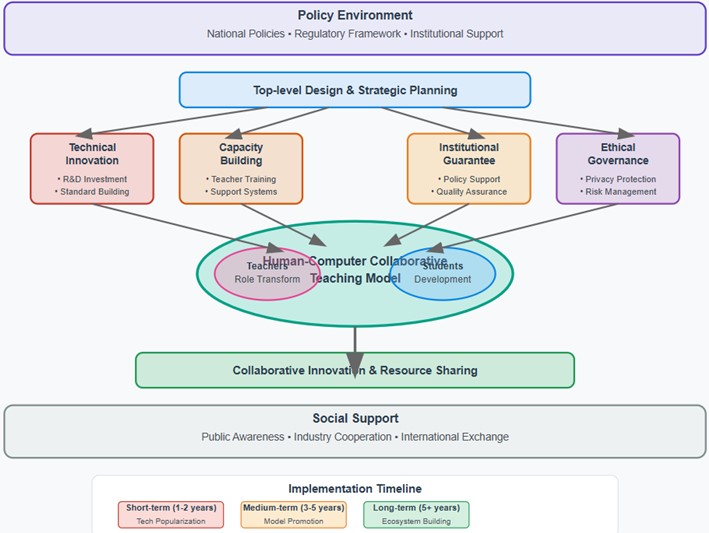Research on the Reconstruction of the Teaching Model for University Ideological and Political Theory Courses from the Perspective of Human-Computer Collaboration
Abstract
With the rapid development of generative artificial intelligence technology, the traditional teaching model for university ideological and political theory courses is facing a profound transformation. This study, based on human-computer collaboration theory and constructivist learning theory, and through in-depth investigation of teaching practices in universities such as Zhejiang University, constructs a teaching model for ideological and political courses that integrates digital human lecturing, AI-assisted learning, human-computer co-creation, and intelligent assessment. The study adopts a mixed-methods research approach to analyze the teaching experiment data of more than 5,000 students. The results show that this model can significantly increase student classroom participation by 30-50%, and 85% of students indicated that their learning interest was significantly enhanced. The study finds that the human-computer collaborative teaching model, through a deep integration of technological empowerment and value inheritance, effectively solves the problems existing in traditional ideological and political course teaching, such as theoretical abstraction, low participation, and insufficient personalization. However, the promotion and application of the model still face challenges such as technological maturity, faculty competence, and ethical risks, which need to be addressed through systematic policy support, capacity building, and collaborative innovation.
References
[2] General Office of the CPC Central Committee, & General Office of the State Council. (2019, August 15). Several opinions on deepening the reform and innovation of school ideological and political theory courses in the new era. People's Daily, (1).
[3] Licklider, J. C. R. (1960). Man-computer symbiosis. IRE Transactions on Human Factors in Electronics, 1(1), 4–11. https://doi.org/10.1109/THFE2.1960.4503259
[4] Popenici, S. A., & Kerr, S. (2017). Exploring the impact of artificial intelligence on teaching and learning in higher education. Research and Practice in Technology Enhanced Learning, 12(1), 1–13. https://doi.org/10.1186/s41039-017-0062-8
[5] Holmes, W., Bialik, M., & Fadel, C. (2019). Artificial Intelligence in Education: Promises and Implications for Teaching and Learning (pp. 45–78). Boston: Center for Curriculum Redesign.
[6] Zhang, Y., Hao, Q., Chen, B. L., et al. (2019). A study on the influencing factors of college students' learning engagement in a smart classroom environment. China Educational Technology, (1), 106–115.
[7] Huang, R. H., Zhang, J. B., & Hu, Y. B. (2021). Intelligent education of human-computer collaboration: Connotation, characteristics and development path. China Educational Technology, (4), 1–8.
[8] Gao, J. J. (2023). Empowering ideological and political education in colleges and universities with mainstream short videos: Value, mechanism and optimization path. Ideological and Political Education Research, (5), 143–149.
[9] Xu, G., & Zou, Z. P. (2022). Practical problems and coping strategies of network short video education in the new era. Ideological & Theoretical Education Herald, (12), 142–147.
[10] Zhang, L. (2024). The trend, response and control of the digital and intelligent development of ideological and political education in colleges and universities. Heilongjiang Researches on Higher Education, (7), 146–152.
[11] Davis, F. D. (1989). Perceived usefulness, perceived ease of use, and user acceptance of information technology. MIS Quarterly, 13(3), 319–340. https://doi.org/10.2307/249008
[12] Vygotsky, L. S. (1978). Mind in Society: The Development of Higher Psychological Processes (pp. 86–91). Cambridge: Harvard University Press.
[13] School of Marxism, Zhejiang University. (2024). Practice Report on AI-Empowered Teaching Reform of Ideological and Political Courses (pp. 23–56). Hangzhou: Zhejiang University Press.
[14] Lin, L., Ginns, P., Wang, T., et al. (2023). Enhancing learning through AI-powered personalized feedback in higher education. Computers & Education, 195, 104718.
[15] Zawacki-Richter, O., Marín, V. I., Bond, M., et al. (2019). Systematic review of research on artificial intelligence applications in higher education. International Journal of Educational Technology in Higher Education, 16(1), 39–65. https://doi.org/10.1186/s41239-019-0171-0
[16] Lin, F. C., & Sheng, B. C. (2023, August 15). Empowering the high-quality development of ideological and political education with generative artificial intelligence. Guangming Daily, (15).
[17] Lai, L. H., & Xie, Y. (2024). Generative AI empowers educational reform: Application potential, risk disclosure and future direction. Journal of Tianjin Normal University (Social Science Edition), (2), 45–53.
[18] Jin, Y., Kwon, J., & Lee, S. (2024). Generative AI in higher education: A global perspective of institutional adoption policies and guidelines. Computers & Education: AI, 5, 100162. https://doi.org/10.1016/j.caeai.2024.100348
[19] Song, H., & Lin, M. (2023). The transformation and reconstruction of teachers' work in the age of ChatGPT. Journal of East China Normal University (Educational Sciences), (8), 1–14.
[20] Ministry of Education and other ten departments. (2022, August 17). Work Plan for Comprehensively Promoting the Construction of "Major Ideological and Political Courses" [EB/OL]. [2024-01-15].
[21] Xu, J., Kim, H., & Park, S. (2025). From recorded to AI-generated instructional videos: A comparison of learning performance and experience. British Journal of Educational Technology, 56(1), 112–128. https://doi.org/10.1111/bjet.13530
[22] Liu, Y., Xu, J. H., & Li, M. (2024). Research on the application of generative artificial intelligence in higher education. China Education Informatization, (3), 35–42.
[23] Tafazoli, D. (2024). Exploring the potential of generative AI in democratizing English language education. Computers & Education: AI, 6, 100183. https://doi.org/10.1016/j.caeai.2024.100275
[24] Feng, T. T., Wang, L., & Zhang, H. (2024). New trends and challenges in the development of digital education. China Educational Technology, (2), 1–8.
[25] Wang, Q. Q., & Zhang, W. S. (2023). Practical exploration of short videos assisting in the construction of major ideological and political courses. Ideological and Political Work Research, (7), 32–35.


This work is licensed under a Creative Commons Attribution 4.0 International License.
Copyright for this article is retained by the author(s), with first publication rights granted to the journal.
This is an open-access article distributed under the terms and conditions of the Creative Commons Attribution license (http://creativecommons.org/licenses/by/4.0/).








1.png)

















